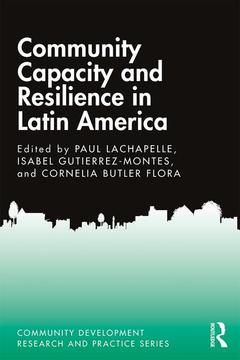Community Capacity and Resilience in Latin America Community Development Research and Practice Series
Coordonnateurs : Lachapelle Paul R., Gutierrez-Montes Isabel, Flora Cornelia Butler

Community Capacity and Resilience in Latin America addresses the role of communities in building their capacity to increase resiliency and carry out rural development strategies in Latin America. Resiliency in a community sense is associated with an ability to address stress and respond to shock while obtaining participatory engagement in community assessment, planning and outcome. Although the political contexts for community development have changed dramatically in a number of Latin American countries in recent years, there are growing opportunities and examples of communities working together to address common problems and improve collective quality of life.
This book links scholarship that highlights community development praxis using new frameworks to understand the potential for community capacity and resiliency. By rejecting old linear models of development, based on technology transfer and diffusion of technology, many communities in Latin America have built capacity of their capital assets to become more resilient and adapt positively to change. This book is an essential resource for academics and practitioners of rural development, demonstrating that there is much we can learn from the skills of self-diagnosis and building on existing assets to enhance community capitals.
Chapter 3 of this book is freely available as a downloadable Open Access PDF at http://www.taylorfrancis.com under a Creative Commons Attribution (CC-BY) 4.0 license.
Chapter 1. Community Capacity and Resilience in Latin America through the Community Capitals Lens
Chapter 2. Promoting Development and Conservation Practice in Latin America and the Caribbean through CATIE Masters Program
Chapter 3. Building Local strategies for the adaptation to Climate Change of Farming Livelihoods: Review of a Participatory Approach Applied in Mesoamerica.
Chapter 4. Bioculturality and Transdisciplinarity: Two Paths for Reaching Sustainability Through Community Capacity Building in Mexico
Chapter 5. Bonds of Faith for Community Change: New Actors in Rural Community Development in El Salvador
Chapter 6. Evaluation on a Shoestring: One International Development Organization’s Experience Measuring Impact in Central America
Chapter 7. Using Community Capitals to Adapt to Environmental Challenges in Rural Uruguay
Chapter 8. Using the Community Capitals Framework to Understand the Potential for Inclusive Innovation: Three Case Studies of an Energy Project in Peru
Chapter 9. Youth Development in Northern Nicaragua: An Empowerment Perspective
Chapter 10. Reflection on Building Sustainable Resilience Solutions to Achieve SDG 2 in Colombia
Paul R. Lachapelle is Professor in the Department of Political Science at Montana State University-Bozeman, USA. His teaching and research spans many disciplines and practices, from community climate change resiliency to social impact investing to diversity, inclusion and social justice topics. His publications include the edited book in this current series, Addressing Climate Change at the Community Level (Routledge 2019) as well as journal articles on energy impacts in communities, democratic practice and local governance, and community visioning. He earned a Ph.D. (Forestry) at the University of Montana's College of Forestry and Conservation with a focus on natural resource policy and governance and serves as Editor of the Community Development Society Current Issues Book Series and member of the Board of Directors (and past-president) of the International Association for Community Development.
Isabel Gutierrez-Montes is Colombian Biologist (Universidad Nacional de Colombia), with a master’s degree in Natural Resources from CATIE and a Ph.D. in Rural Sociology from Iowa State University. Isabel works in Mesoamerica and South America using qualitative research methods as a diagnostic and planning tool in landscape management, assessment of vulnerability, implementation of farmer field schools, and socioenvironmental educational programs. She currently is the dean of CATIE (Tropical Agricultural Research and Higher Education Center) graduate school. In the past she has been the academic coordinator of the Environmental Socioeconomics Master’s Program, Coordinator and Leader of the Mesoamerican Agroenvironmental Program (MAP) and Director of the Development and Conservation Academic Program (PAPDC) at CATIE, Costa Rica. In the academic field, she has been a principal advisor for the Ph.D. theses of three students and served on Ph.D. thesis committees for two students, as well as major professor for the master’s theses of 46 studen
Date de parution : 07-2020
15.6x23.4 cm
Date de parution : 07-2020
15.6x23.4 cm
Thèmes de Community Capacity and Resilience in Latin America :
Mots-clés :
Decadal Climate Variability; STI Policy; Asset-based community development; Biweekly Trainings; Bottom-up community infrastructure; Ministerio De Salud; Community Built Association; Ministry Of The Environment; Community action; United National Development Programme; CCF; Community engagement; CCI; Community involvement; Energy System; La Guajira; Do-it-yourself urbanism; Energy Committee; Downtown revitalization; Inclusive Innovation; Empowerment; Young Highlanders; Local capacity; Biocultural Resources; Local culture; Northern Highlands; Local identity; Plata River; Public engagement; National Governmental Institutions; Right to the city; Smallholder Farmers Group; community assessment; Community Change Efforts; community capacity; Human Development Index; Latin American countries; Effective Evaluation Framework; resiliency; Initial Baseline Evaluations; NGO Project; Las Cruces; Community Capitals


